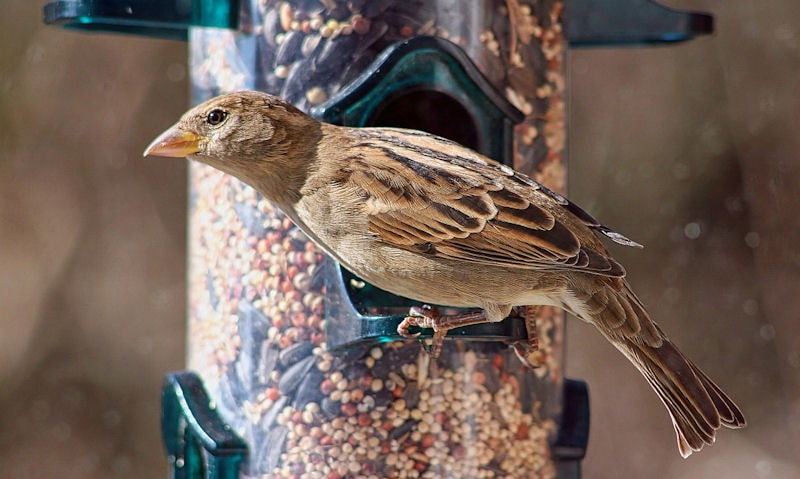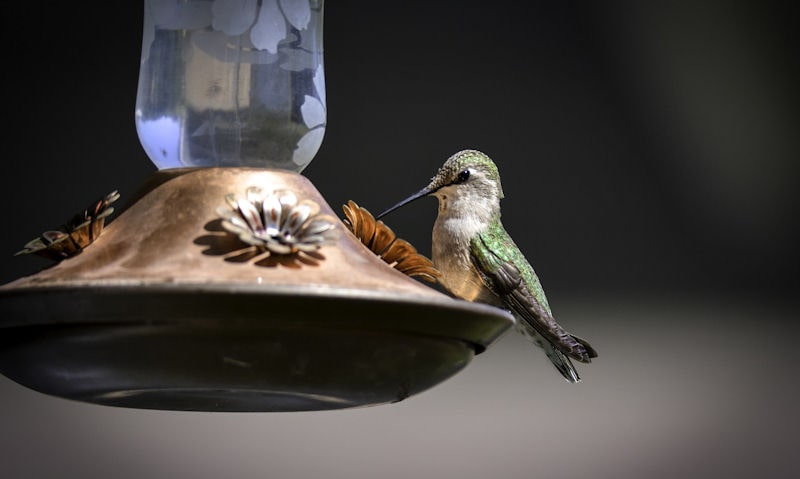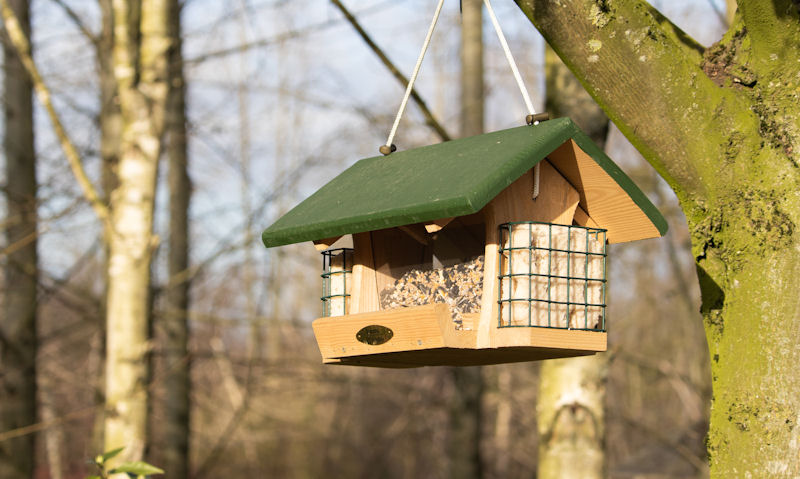How often should you fill a bird feeder
Never depend on others opinion when knowing to fill a bird feeder, it will depend completely on you, plus how frequently the wild birds in your yard eat up your resources.
How often should you fill a bird feeder is usually once every two weeks in milder conditions on average. That will then rise to once a week in warmer months or during the summertime. Bird food in use can last longer or germinate sooner, while the bird feeder can also sustain feed or damage the feeder if food rots.
Fill your bird feeder with brand new, fresh bird food of any kind to be sure there's no risk of bacteria forming on the bird food which wouldn't be visible to the naked eye early on.
What you put in a bird feeder like seed mixes can far outlast peanuts, which tend to rot quickly as they are not protected in a shell, like seeds are in its husk.
Dried mealworms do last well outdoors but so does quality suet cakes or fat balls.
Obviously, you'd fill a bird feeder as soon as its run out or is currently running low. When in fact this wouldn't be true for many of you, as wild bird food is seen to rot long before its all eaten up by your common backyard birds.
How often should bird food get switched out for new can also depend on what your bird feeder is made of.
Its not always a case of protecting bird food and therefore wild birds; as a wooden bird feeder for example can be permanently damaged by rotting food - whereas a plastic or metal bird feeder can withstand rotting food.
To fill a bird feeder of any kind with bird food once every two weeks, in most cases you can get ahead of rot setting in.
Whereby filling up a bird feeder in summer may require you to re-fill the feeder once or twice a week as hot conditions can cause bird food to germinate with bacteria.
Once every two weeks
Unfortunately there's no definitive answer to how often should you re-fill a bird feeder, as so many areas of a bird feeder can reduce or extend the life of bird food.
What is probably going to be the average of swapping out all kinds of bird food, is probably once every two weeks. It will be two weeks or less in warm to mild weather, whereas a scorching summer can result in a once or twice weekly re-fill.
Mild weather can sustain bird food in an outdoor environment but the heat of the sun can cause the bird food to rapidly germinate.
How often should bird feeders be filled up is every two weeks then, even if the bird food doesn't appear to be in bad shape.
It won't be a good idea to only re-fill wild bird food when its seen to be rotting, when in fact long before now bird food in use would need to be throw away as bacteria develops.
With bird feeder food its often difficult to notice any signs of rotting or gone bad bird food, thus its best to just assume bird food only lasts two weeks to be on the safe side.
Refill bird feeders every two weeks if you like but thankfully you'd get a bit of time off in the fall through winter - as a bird feeder may only need to be changed out once a month.
Once a month only if bird food doesn't get eaten as often, but only if the cold weather can sustain the bird food for longer.
Hotter days is once a week
Urgency of a swapping out any kind of bird food like seeds, peanuts or suet can depend on the weather or what kind of bird feeder is in use.
To suspend bird food within a contraption that is prone to creating humid conditions internally - then sure you must fill your bird feeder once or twice a week in super hot or humid months.
Bacteria thrives on humidity thus the growth of nasty germs will develop on all bird food, whether you can see it or not.
It can be bit of a bother to constantly re-fill your bird feeders but remember your birds will continue to come back to clean bird food.
How often you should fill your bird feeders in summertime will always come after you clean your bird feeders in soapy hot water to kill off any bacteria - all while cleaning up bird food stains on the feeder interior.
What you can do though to reduce how often you clean bird feeders in warmer months is to keep bird feeder out of the sun, while prioritizing a shaded area.
As damp conditions can cause bacteria to develop, a shaded area within the yard can keep bird feeders dry for as long as they remain under cover.
Whilst many of you don't have shelter to position bird feeders under, don't worry - it just means you need to fill bird feeders more often in summer or in colder months even.
Bird food type varies
How often should any kind of bird feeder food by replaced with clean, fresh bird feed would depend on the bird food in use.
In addition, it can rely on the quality of the bird food and how long it has left on its expiry date, in which it begins as soon as the packaged is opened.
Most common bird feeder food can vary in how long it will last, including:
- Bird seeds will last far longer than any other kind of bird food because its protected in its husk, thus wild bird seeds of any type must be prioritized
- Peanuts don't last for very long because the meat of the nut is exposed to the elements, thus the damp conditions can cause an health hazards
- Suet in fat ball, pellet or suet in a suet cake bird feeder can last long if hung up in a feeder, although suet pellets on the ground will last only a couple of days in dry conditions or a day if its wet
- Dried mealworms will last quite long if offered to birds off the ground, while its unlikely they'd go beyond a day or two as mealworms are popular with wild birds
- Nectar-filled hummingbird feeder sugar water must be filled up once or twice a week, as sugar water will no doubt begin to spoil
Never allow bird food of any kind to run low or run dry so you can re-fill it again, it doesn't work like that when taking care of bird feeders.
If it appears there's far too much bird food to simply throw away, then that is how it must be - if kept any longer the bird food will become a health hazard for you and your birds.
Similarly, depending on the type of bird feeder in use, specific bird food can make a mess while bird seeds in particular, stay far more tidy.
Minimize bird food waste
How often to fill a bird feeder relies on when bird food is due to go bad, its never about filling a bird feeder when its running dry.
Bird food can last months before its eaten up, or if its eaten at all. So therefore bird food can rot away while you believe it can still be eaten by your birds.
In reality, bird food won't always get eaten unless at times when fledglings leave the nest to come and feed at your bird feeders daily, and for the proceeding months ahead.
Rather than throwing what was expensive quality bird food mixes then, you'd need to minimize bird food waste at the beginning. What that involves is simply using far less bird food in what could be a bird feeder demanding more bird feed.
Larger bird feeders don't have to be kept full just as rarely used up small bird feeders don't need to be filled up to the top.
Minimize bird food waste by only using as much as you believe would be eaten within a week or two.
You'd only know this when feeding birds in your yard for several months now, because you'd get an idea what goes and what doesn't.
On a similar note, a large capacity 30 oz. hummingbird feeder doesn't always need to be filled up, when there's no harm in doing so. In fact what size a hummingbird feeder you have chosen can just make sure you can feed all hummers in busier times.
Summary
Let me just say how often you should fill a bird feeder can be very specific to your personal circumstances.
With that in mind it will depend on bird food quality, location, the weather, season, bird feeder material - and of course how quickly bird food is eaten up.
Rarely should you fill a bird feeder only when its run out of food, as bird feed doesn't often get eaten up by birds before its due to be thrown away.
But what I can say is a bird feeder will need to be replenished based on swapping out old bird food before it goes rotten inside the bird feeder. All bird feeder food as an expiry date thus it can't be left in bird feeders forever.
Never wait for signs of rot or poor quality bird food as you'd only need to re-fill a bird feeder once every two weeks in milder conditions, and that is if it lasts that long.
In hotter summer months how often a bird feeder will need re-filling could be once or twice a week. Humidly or heat is a cause of bacteria rapidly germinating inside bird feeders, and will need changing far more often.
What kind of bird food you are using can last quite long such as bird seeds, dried mealworms or suet - whereby peanuts can be seen to germinate far sooner than anything else on the menu.
In anticipation of bird food not being eaten up in time, do reduce waste by only filling up an extra large or even a small bird feeder a third or half way up only.


